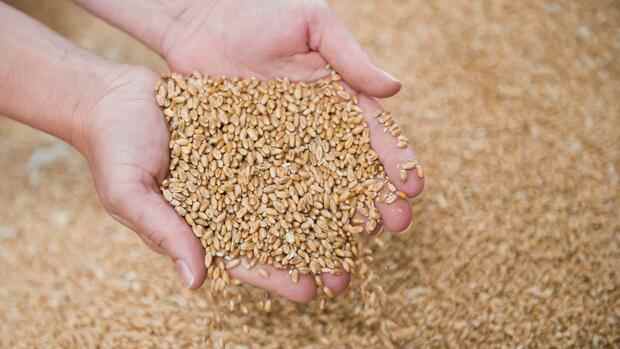Russia and Ukraine account for a quarter of world wheat exports.
(Photo: dpa)
Nothing is as socially explosive as rising food prices and hunger. The bloody riots of the 2011 Arab Spring were a result of wheat shortages triggered by a drought in China. Of the nine largest wheat importers in the world, all located in the Middle East, seven have been rocked by unrest. In Egypt, a 40 percent rise in the price of bread ended nearly 30 years of Hosni Mubarak’s rule. The Syrian civil war would probably never have started without the drought of 2009.
It is difficult to claim that the Middle East has since developed into a stable region. If grain prices were to rise again, the result would be an “Arab Spring 2.0” – with even more conflicts and a new, even larger wave of migration towards Europe. A horrific scenario.
But exactly such a scenario is imminent. Russia (18 percent) and Ukraine (8 percent) account for a quarter of global wheat exports and also play a crucial role in world markets for other grains.
>> Read also here: “A tank is now also a defensive weapon” – Ukraine’s ambassador calls for further arms deliveries from Germany.
Top jobs of the day
Find the best jobs now and
be notified by email.
In the face of war, destruction and sanctions, we must assume that production will fall and exports will be significantly lower. As early as November, Russia and China imposed an export ban on fertilizers, which further fueled the price increase. In addition, wheat inventories were at a five-year low at the end of 2021.
The price of wheat had already risen significantly before the attack on Ukraine and is now approaching 2012 levels again. The EU must act quickly and decisively to avoid massive social destabilization on our doorstep.
Rich Europe can handle higher prices
In addition to broad support for grain cultivation in the EU – France and Germany account for 15 percent of world exports – relevant quantities must be diverted to the detriment of local consumption. The wealthier population of Europe is better able to cope with higher prices and to switch to alternative foods than people in northern Africa.
Daniel Stelter is the founder of the discussion forum beyond the obvious, which specializes in strategy and macroeconomics, as well as a management consultant and author. Every Sunday his podcast goes online at www.think-bto.com.
(Photo: Robert Recker/ Berlin)
Concretely, this means that the European Union should buy up wheat at market prices and deliver it cheaply to our neighbors on the other side of the Mediterranean. As a result, prices in this country would rise disproportionately, and we also have to spend tax money on subsidies. This is unpopular, but the cheapest way, given that the cost is almost negligible compared to the social and financial burden of new unrest and migration flows.
The war in Ukraine has shown us painfully how important geopolitical thinking is. When it comes to food prices, we have an opportunity to prove that we have learned the lesson.
More: War in Ukraine drives food prices to record highs.
